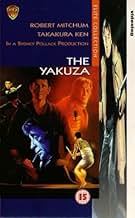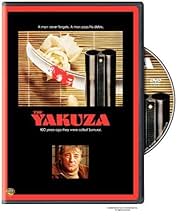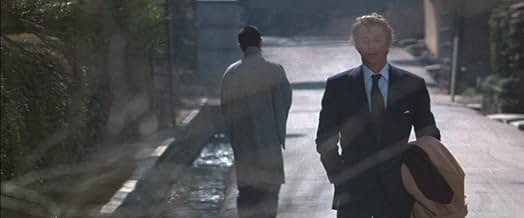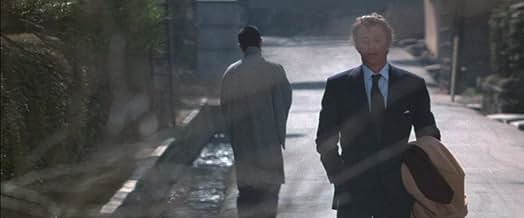AVALIAÇÃO DA IMDb
7,2/10
11 mil
SUA AVALIAÇÃO
O detetive particular americano, Harry Kilmer, retorna ao Japão para resgatar a filha sequestrada de um amigo das garras da Yakuza.O detetive particular americano, Harry Kilmer, retorna ao Japão para resgatar a filha sequestrada de um amigo das garras da Yakuza.O detetive particular americano, Harry Kilmer, retorna ao Japão para resgatar a filha sequestrada de um amigo das garras da Yakuza.
- Direção
- Roteiristas
- Artistas
Ken Takakura
- Ken Tanaka
- (as Takakura Ken)
Eiji Okada
- Toshiro Tono
- (as Okada Eiji)
Keiko Kishi
- Eiko Tanaka
- (as Kishi Keiko)
Kyôsuke Machida
- Jiro Kato
- (as Kyosuke Machida)
Eiji Gô
- Shiro 'Spider' Tanaka
- (as Go Eiji)
- Direção
- Roteiristas
- Elenco e equipe completos
- Produção, bilheteria e muito mais no IMDbPro
Avaliações em destaque
Not only is this a good 70's gangster/action flick, it is also one of the few movies about Japan ever produced in the States that does not make too many mistakes about Japanese culture.
Ken Takakura puts in a great performance which is no surprise since he first became famous in Japan for acting in yakuza (gangster) movies.
Anyone who has ever tried to understand or explain the concept of "giri" should see this movie!
Ken Takakura puts in a great performance which is no surprise since he first became famous in Japan for acting in yakuza (gangster) movies.
Anyone who has ever tried to understand or explain the concept of "giri" should see this movie!
Superb East-meets-West movie, I suspect largely due to Schrader's insight. Takakura Ken's performance really steals the show, though all actors are more than capable; Mitchum gives a great performance again. Not a martial arts movie, but contains a katana showdown that I can watch over and over again without finding fault [more believable than anything you'll see in 'Kill Bill'].
The story is gorgeously convoluted, keeping it's secrets to the very end, in a fitting Japanese manner. Action scenes are relatively restrained, and the story tells how Mitchum's character finally comes to understand Takakura Ken's character, and his apparently icy antagonism. When can we see a DVD copy?!
The story is gorgeously convoluted, keeping it's secrets to the very end, in a fitting Japanese manner. Action scenes are relatively restrained, and the story tells how Mitchum's character finally comes to understand Takakura Ken's character, and his apparently icy antagonism. When can we see a DVD copy?!
The Yakuza introduced we occidentals to the term the Japanese use for their various crime families. Probably after the wide acceptance of both the Godfather films, the American public was ready to see what organized crime looked like in another culture.
La Cosa Nostra, the Mafia, all those phrases we use for Italian organized crime certainly had their rituals and traditions. But as we learn in watching this film they have nothing on the Yakuza.
Robert Mitchum plays a private detective who works both sides of the law back in the states and he's hired by crime boss Brian Keith to rescue his daughter who was kidnapped by one of the Yakuza crime families in lieu of a shipment of weapons Keith was supposed to deliver. Coming along with him is young Richard Jordan whose father was a friend of both Mitchum and Keith as backup.
The mission is accomplished, but Mitchum and Jordan find the situation is a whole lot more complex than they were led to believe. In addition Mitchum gets involved with an old girl friend from the days when he was a military policeman during the postwar American occupation. She's the key to getting help from a former Yakuza member in their quest.
The American actors perform well here and oriental players James Shigeta and Japanese film star Takakura Ken are well cast as feuding Yakuza brothers. You will not question why Takakura Ken is known as the Japanese Clint Eastwood after seeing The Yakuza.
Director Sydney Pollack shows a real reverence and respect for the traditions of another culture. The Yakuza is both entertaining and informative and should not be missed.
La Cosa Nostra, the Mafia, all those phrases we use for Italian organized crime certainly had their rituals and traditions. But as we learn in watching this film they have nothing on the Yakuza.
Robert Mitchum plays a private detective who works both sides of the law back in the states and he's hired by crime boss Brian Keith to rescue his daughter who was kidnapped by one of the Yakuza crime families in lieu of a shipment of weapons Keith was supposed to deliver. Coming along with him is young Richard Jordan whose father was a friend of both Mitchum and Keith as backup.
The mission is accomplished, but Mitchum and Jordan find the situation is a whole lot more complex than they were led to believe. In addition Mitchum gets involved with an old girl friend from the days when he was a military policeman during the postwar American occupation. She's the key to getting help from a former Yakuza member in their quest.
The American actors perform well here and oriental players James Shigeta and Japanese film star Takakura Ken are well cast as feuding Yakuza brothers. You will not question why Takakura Ken is known as the Japanese Clint Eastwood after seeing The Yakuza.
Director Sydney Pollack shows a real reverence and respect for the traditions of another culture. The Yakuza is both entertaining and informative and should not be missed.
I stumbled across this movie, back when I was in college, on late night television. At the time, I wasn't a Robert Mitchum fan. I always thought Mitchum had a way of sauntering through film roles, not always giving his best. The Yakuza, made when Mitchum was 58 years old, utilizes his style and persona to its maximum potential. He's world-weary, he's been through the mill and he's come out wiser, but not necessarily harder for it.
Written by Paul Schrader and Robert Towne, The Yakuza shows us a different side of the Gangster world than we have been privy to before. This is not a movie of good vs. bad; it's a movie about loyalty and honor to friends and family. We follow Mitchum as Harry Kilmer on a mission to save a friends daughter. For most movies made these days, that premise would be enough, but The Yakuza is deeply layered and far more interesting than that. It turns out that Harry had been in Japan after WWII and had fallen in love with a beautiful woman, Eiko. 30 years later Harry is back in Japan, much has changed, but his feelings haven't.
Harry teams up with Ken Tanaka, Eiko's brother, to find the kidnapped girl. Samurai swords slash and guns blaze, adding intense, well-choreographed action as the plot thickens and Harry realizes that this is no ordinary rescue. We learn a lot about the characters in the movie, from Harry and Eiko to Ken Tanaka and Harry's buddy George, but more than that we learn about Japan and its infamous and historic gangster world. This is a classic movie in every sense of the word and should be viewed as such. And if you're not a fan of Robert Mitchum before seeing this movie, you will be afterwards.
Written by Paul Schrader and Robert Towne, The Yakuza shows us a different side of the Gangster world than we have been privy to before. This is not a movie of good vs. bad; it's a movie about loyalty and honor to friends and family. We follow Mitchum as Harry Kilmer on a mission to save a friends daughter. For most movies made these days, that premise would be enough, but The Yakuza is deeply layered and far more interesting than that. It turns out that Harry had been in Japan after WWII and had fallen in love with a beautiful woman, Eiko. 30 years later Harry is back in Japan, much has changed, but his feelings haven't.
Harry teams up with Ken Tanaka, Eiko's brother, to find the kidnapped girl. Samurai swords slash and guns blaze, adding intense, well-choreographed action as the plot thickens and Harry realizes that this is no ordinary rescue. We learn a lot about the characters in the movie, from Harry and Eiko to Ken Tanaka and Harry's buddy George, but more than that we learn about Japan and its infamous and historic gangster world. This is a classic movie in every sense of the word and should be viewed as such. And if you're not a fan of Robert Mitchum before seeing this movie, you will be afterwards.
The strongest point of this film is the writing. It's the first Paul Schrader script ever to be filmed, written with his brother Leonard (who also worked with Paul on Blue Collar & Mishima) and Robert Towne (Chinatown, Marathon Man, Bonnie & Clyde). It seems we have the best of both Schrader's here; Leonard really understands the Japanese culture and Paul is a very cerebral and thematic writer who almost always raises a number of interesting issues.
The film, which is very respectful of it's foreign culture and tries to be as true as possible to it, first and foremost shows the differences between American and Japanese culture. However, there are so many themes in this movie though that it becomes tiresome to list them. The key ones include honor, loyalty, burden, duty, friendship, love, loss, obligation, and the differences between the men of pre and post war Japan.
Although Robert Mitchum was approaching 60 when made the film, he still possessed enough of his trademark grace to be credible enough against much younger men in the action scenes. He always exudes so much casualness and weariness, but his work here shows he was obviously fired up by the material.
The other standout actor is Ken Takakura. He plays an honorable man that everyone respects, but his honor and old ways also often make him intolerable to anyone around him. He hides the deep wounds of his character behind his stone face, but that doesn't in any way prevent him from conveys that he's a miserable man from another age who lives by his code but not for anything. As he's the native that used to be in the Yakuza and Mitchum is the gaijin that doesn't have to follow their honor system (although as the movie progresses, he subscribes to their codes and honor system more and more), Takakura gets to do all the skilled swordplay. His fighting won't thrill those who want a lot of stunts, but is great if you enjoy the psychology and strategy of the craft.
The film is it has a drab, low budget kind of look, mainly as a way to maintain the mood and tone of the piece. Some of the scenes really bring the material to life, particularly through some excellent camera work, but sometimes the look is indifferent and the soundtrack seems to be trying too hard. Aside from staying true to the material and getting strong performances, I wouldn't say that Sydney Pollack has done a great job here. This is not the kind of movie you watch if you are looking for John Woo action though, and for the most part the flaws are overshadowed by the strength of the script and performances. 8/10
The film, which is very respectful of it's foreign culture and tries to be as true as possible to it, first and foremost shows the differences between American and Japanese culture. However, there are so many themes in this movie though that it becomes tiresome to list them. The key ones include honor, loyalty, burden, duty, friendship, love, loss, obligation, and the differences between the men of pre and post war Japan.
Although Robert Mitchum was approaching 60 when made the film, he still possessed enough of his trademark grace to be credible enough against much younger men in the action scenes. He always exudes so much casualness and weariness, but his work here shows he was obviously fired up by the material.
The other standout actor is Ken Takakura. He plays an honorable man that everyone respects, but his honor and old ways also often make him intolerable to anyone around him. He hides the deep wounds of his character behind his stone face, but that doesn't in any way prevent him from conveys that he's a miserable man from another age who lives by his code but not for anything. As he's the native that used to be in the Yakuza and Mitchum is the gaijin that doesn't have to follow their honor system (although as the movie progresses, he subscribes to their codes and honor system more and more), Takakura gets to do all the skilled swordplay. His fighting won't thrill those who want a lot of stunts, but is great if you enjoy the psychology and strategy of the craft.
The film is it has a drab, low budget kind of look, mainly as a way to maintain the mood and tone of the piece. Some of the scenes really bring the material to life, particularly through some excellent camera work, but sometimes the look is indifferent and the soundtrack seems to be trying too hard. Aside from staying true to the material and getting strong performances, I wouldn't say that Sydney Pollack has done a great job here. This is not the kind of movie you watch if you are looking for John Woo action though, and for the most part the flaws are overshadowed by the strength of the script and performances. 8/10
Você sabia?
- CuriosidadesMartin Scorsese wanted to direct after Caminhos Perigosos (1973), but the producers wanted Sydney Pollack. Scorsese is on record that he would very much have liked to direct the film and was disappointed that he was passed over. However, he got to direct Alice Não Mora Mais Aqui (1974) instead after being sought out by Ellen Burstyn. "Alice" ended up making more than 20 times its budget and won Burstyn an academy award, while this film became a box office bomb.
- Erros de gravaçãoThe plane that Kilmer is boarding at the end is a Boeing 707; the one shown taking off in the last scene is a 727.
- Versões alternativasFor the Spanish Castilian version all the dialogues were dubbed to Spanish, even the Japanese lines.
- ConexõesFeatured in ...Promises to Keep (1974)
Principais escolhas
Faça login para avaliar e ver a lista de recomendações personalizadas
- How long is The Yakuza?Fornecido pela Alexa
Detalhes
Bilheteria
- Orçamento
- US$ 5.000.000 (estimativa)
- Tempo de duração
- 1 h 52 min(112 min)
- Mixagem de som
- Proporção
- 2.39 : 1
Contribua para esta página
Sugerir uma alteração ou adicionar conteúdo ausente


































